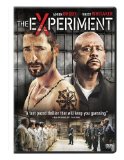| Reviews & Columns |
|
Reviews DVD TV on DVD Blu-ray 4K UHD International DVDs In Theaters Reviews by Studio Video Games Features Collector Series DVDs Easter Egg Database Interviews DVD Talk Radio Feature Articles Columns Anime Talk DVD Savant Horror DVDs The M.O.D. Squad Art House HD Talk Silent DVD
|
DVD Talk Forum |
|
|
| Resources |
|
DVD Price Search Customer Service #'s RCE Info Links |
|
Columns
|
|
|
Experiment (2010), The
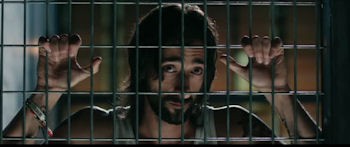
The Movie
The first warning sign was that little sticker on the plastic wrap of the DVD box, a little fist punching me in the face and ordering me to go to Sony's ActionUnleashed.com site, where a bigger fist was waiting to punch me in the face again as I perused it's testosterone-rich offerings. The sticker is fitting, and should help you keep your expectations in check. That's because ultimately, The Experiment--despite its source material and its attempts at drawing powerful parallels to current events--feels like a Fight Club video game adaptation, not a "statement" movie about the nature of man and his propensity for violence. The film likes to hammer home repeatedly (starting with the opening credits) that we're all just animals...and who's to say we wouldn't do the same thing as those Abu Ghraib soldiers? (Hell, even one of the production company placards before the film is for Natural Selection!)
In 1971, an experiment conducted at Stanford University explored the psychological and behavioral impact on subjects assigned to be guards and prisoners in a mock environment. That controversial study--which lasted only six days instead of a planned two weeks--inspired the Mario Giordano novel Black Box, which in turn inspired Das Experiment, the 2001 German film from director Oliver Hirschbeigel (and co-adapted by Giordano). This 2010 American version also lists Black Box as its source, and it's clear the German film has also had an influence. Director Paul Scheuring (no stranger to jails, he created the Fox show Prison Break) wrote the screenplay for this latest version, which is leaner (running 24 minutes shorter) and a lot meaner. It also has a pretty great cast headlined by the can't-miss combo of Oscar winners Adrian Brody and Forest Whitaker. So why, pray tell, did this go straight to DVD?
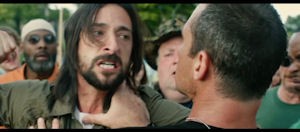
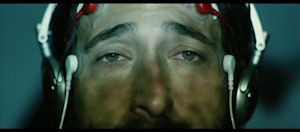
The two play strangers who meet after responding to an ad in the newspaper seeking subjects for a two-week behavioral study with a handsome paycheck. Since Travis (Brody, taking over for the great Moritz Bleibtreu) just lost his job (the German film's subplot with the protagonist being an undercover reporter has been dropped here) and wants to head to India with new girlfriend Bay (Maggie Grace in a role greatly diminished from the German film), he sees the experiment as the perfect opportunity. The two lovebirds have just met at a peace rally where a fight breaks out, causing Travis to raise his fist to defend her honor in another one of those "statement scenes" that foreshadows things to come. See, we all have breaking points, and Travis may just be a hippie liberal hypocrite ("War is in here," says Bay, pounding her heart; so true, honey...so true!).
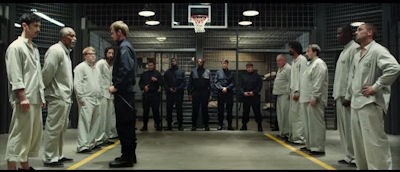
"This experiment is not about individuals," the guards are told. "If any one person leaves, it's over. If a prisoner does break the rules, you will have 30 minutes to choose proper disciplinary action." But as the subjects are divided into two camps, the prisoners start to question the study as some of the guards begin to exert their authority a little too enthusiastically. As the rules start to be broken (subjects must eat all of their food, address each other by numbers, never touch the guards and speak only when spoken to), the threat of violence escalates--which would end the experiment and the payout. That doesn't sit well with the guards, who soon find an unlikely leader in the mild-mannered Barris (Whitaker). But since we already know that Barris has some Norman Bates-like issues, we aren't quite as shocked by his transformation (but that boner he gets after exerting his newfound power? Yeah, didn't see that coming...). He and Travis are soon locked in a battle of wills, the two leaders trying to rally their troops as a war threatens to break out.
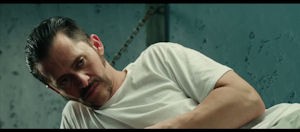
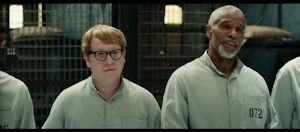
Joining Travis are Nix (Clifton Collins Jr.), a quiet and creepy loner with a secret ("Throw some animals in a cage and get to find out which one of us is gonna be the lions and which one's gonna get cut!"); and Benjy (Ethan Cohn, apparently channeling a young Philip Seymour Hoffman), a meek comic book artist who--like Barris--is introduced with such obvious intent, we immediately know the exact arc his character will follow (his latest creation is "Flying Man", a hero that just wants to spread his wings and be somebody, dammit!).
Because this version is shorter, the other prisoners aren't developed quite as much as they were in the German film (which included the always awesome Wotan Wilke Möhring in a role that was dropped here). Only two others are given real screen time, including the character that irked me the most about this film: Oscar. I was surprised he even had a name, and half expected Jason Lew to be listed as "Gay Prisoner" in the credits. Try as I might, I simply can't find any rational explanation for this under-developed character other than cheap and violent titillation. I imagine he was injected in an effort to make the film more hip and current, but his presence just ends up being insulting.
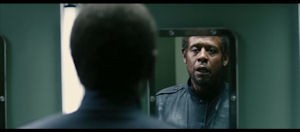
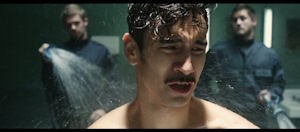
If Scheuring had a conversation with someone about Oscar's role, it probably went something like this:
"Hey, maybe I should make one of the prisoners gay! That'll really update the story for 2010. Gay people are totally the rage these days."
"Yeah, totally."
"Hmm, but we wouldn't want him to have many lines or anything."
"No?"
"And we should cast a really svelte and short actor who can play 'helpless' really well. I've got some good stuff planned for the character, and I don't want him to be able to fight back."
"I guess that makes sense."
"Hmm, what derogatory terms can we have the guards call him?"
"Fag?"
"Nah, too harsh...how about 'Boy George' and 'Moulin Rouge'? You know, it gets the point across, but it's kinda funny, too."
"Good idea."
"In one scene, a guard will try and force him to perform oral sex."
"Harsh, man."
"He gets rescued, but only because another guard walks in just in time. Otherwise he would have been on his knees in a second."
"Sure."
"Then later, we'll get that same guard to rape him."
"Sounds brutal."
"And I wrote a catchy line for the guard: 'You know, if your mouth doesn't wanna play nice, well, I'll just have to use the other end!' Audiences are gonna love that!"
"Yeah, they might laugh."
"Plus it's not really rape if the victim is a guy, right? And he gets saved anyway...not because he can fight back or anything, but because one of the macho straight prisoners steps in."
"Right on. Do you want to give him any more scenes or dialogue to develop his character or story, like the others? You know, so those scenes would at least have more impact and meaning?"
"Huh? What do you mean? I told you he was gay!"
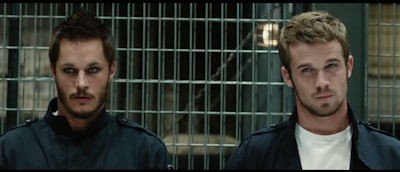
Continuing with the "hip" character trend are Barris's two main henchmen: Chase (rising star Cam Gigandet of Twilight and Pandorum), a sex-lovin' ladies' man who is either really homophobic or really in the closet; and Helweg (Travis Fimmel), another cool dude with a goth twist: he wears eyeliner and nail polish, has a nose ring and a faux-hawk (yeah, he may be in the closet, too...). The two spend a lot of time staring ionto the camera with a smoldering gaze. It's an odd choice that makes the film seem likes it's trying too hard to appeal to the CW crowd--these two are pretty similar and a little too pretty, and neither is developed at all. As for the two dissenting guards? They barely register (one doesn't speak until 75 minutes in--too little, too late!) while the other (David Banner's Bosch) comes across uncharacteristically weak at the most important time. It further proves that the film isn't concerned with details like, you know, conflicts of conscience.
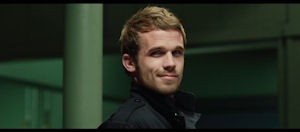
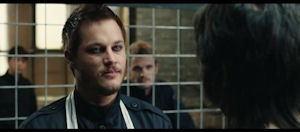
One of the film's biggest mistakes is the Benjy character, and a development late in the story doesn't make any sense (for multiple reasons)--then again, not much in the film does. One of the best things about the German film was the Schütte character, played beautifully by Oliver Stokowski. He gave the film its most sincere moments and provided the biggest emotional punch, a little humanity in the crazy proceedings. Here, that character has been morphed into Benjy, who doesn't come close to having the same impact. Unlike the sympathetic Schütte, Benjy feels forced. I also wasn't keen on the transformation of the original's Steinhoff character, far more intriguing in the original. As played by the great Christian Berkel (Downfall, Valkyrie, Inglorious Basterds...wow, the original had quite a cast!), the character was a powerful presence. Here, counterpart Nix is just creepy (a character trait we learn later adds a new level of bad taste to the violent proceedings).
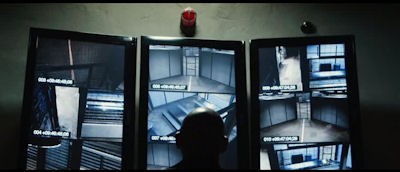
I'm being harsh, and to be fair this 2010 version does a lot of things better than the original. In addition to its more isolated setting, the biggest improvement is the virtual disappearance of the experiment administrators (probably a really good thing considering Fisher Stevens is miscast as the lead doc). In the 2001 film, their presence created too many questions that couldn't be answered: Three irresponsible psychiatrists were left in charge of the massive experiment, and their behavior made no sense--casting severe doubt on the film's believability.
Here, the subjects are watched over by Big Brother-like cameras, the purpose of the experiment left in doubt. We start to wonder if something more sinister is at work, and by leaving those intentions to our imagination, the 2010 version is a little more convincing. The behavior of the guards is also slightly more believable, as their fear of the "red light" (signaling a violation of rules and the end of the experiment) is constantly hovering over them . When their punishment of the prisoners keeps the red light off, they figure they're on the right track. "The red light is the only thing we have," says Barris, convinced that his purpose is to punish and humiliate.
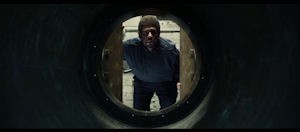
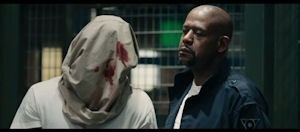
The new film also does a little better job of believably setting up the chain of events that lead to the final conflict, if "believable" can be used to describe a film like The Experiment. I'm not sure this story could ever be done right for the silver screen given the liberties Hollywood often takes to make movies more marketable; this 2010 version is certainly the flashier of the two (I'm also guessing Scheuring is a fan of A Clockwork Orange; one of the more arresting visuals here tips its bowler hat to the classic, and I'm not talking about the eye-opening violent movie our "hero" has to watch). The material is probably best suited to a Twilight Zone adaptation, even if it is based on true events.
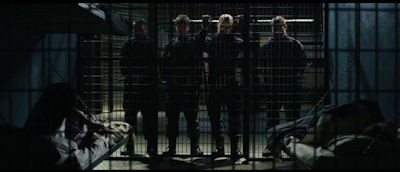
This version is also darker, more serious and filmed with more style than the original, which was a little more concerned with story than visual fireworks and brute force. This one isn't as cerebral, but if you're in the mood for a mindless and bloody action effort that tries to disguise itself as a message movie, it offers some bloodlust entertainment (and for fans who loved that Psycho II-inspired scene from the original, it's here, too). And despite the film's flaws, Brody and Whitaker have a presence that can overcome some of the script's shortcomings; their delivery alone is hard to dismiss, and at least Whitaker isn't boring.
And if you can forgive the highly unnecessary final exchange at the end (which further proves this film is trying too hard, repeatedly stating the obvious like we're idiots), the ending here is a little more effective. Even if it raises more questions, it shows that a better movie was aching to get out of this Experiment.
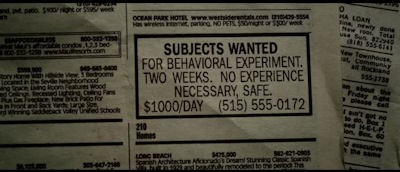
The DVD
Video:
The 2.40:1 anamorphic widescreen transfer here looks fantastic. The Experiment opts for cold, sterile tones, frequently employing a green hue to many of the scenes. Sharpness and detail are very solid, with flesh tones, detailing on walls and even a Michelin tire all impressing.
Audio:
I initially though the balance in the 5.1 track was a little off, as the dialogue seemed to be overpowered by the ambient sound. But it settles in nicely, and fits the film's loud and dynamic nature. Subtitles are available in English and English SDH.


Extras:
Sadly, a film with an inspiration and history like this one is screaming for a horde of extras on the fascinating real-life events, but Sony seems content to dump this on DVD with some measly trailers (actually, Red Hill looks intriguing...Lake Placid 3? Not so much...).
Final Thoughts:
If you're up for some bloodlust entertainment, this violent Experiment certainly has enough energy and brute force to keep you mildly amused. It also features a few Oscar-winning actors whose mere presence and energy slightly lifts mediocre material. Leaner and meaner than the more cerebral 2001 German effort, this flashier entry hits us over the head too much in its attempt to disguise itself as a message movie, and makes some questionable character choices that highlight its weaknesses (almost as weak as its gay prisoner!). At heart, it's a wolf in snake's clothing. Rent It.

|
| Popular Reviews |
| Sponsored Links |
|
|
| Sponsored Links |
|
|
| Release List | Reviews | Shop | Newsletter | Forum | DVD Giveaways | Blu-Ray | Advertise |
|
Copyright 2024 DVDTalk.com All Rights Reserved. Legal Info, Privacy Policy, Terms of Use,
Manage Preferences,
Your Privacy Choices | |||||||









